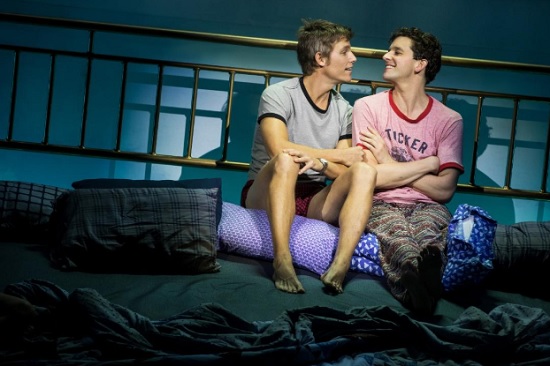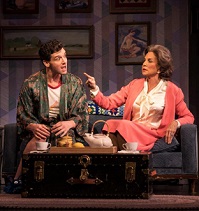Harvey Fierstein's Torch Song

Tickets from $49 Buy Tickets

Cititour.com Review
Is there a braver man in the theatrical firmament than Michael Urie? Having tackled everything from Gogol to Shakespeare in the past two years, this fearless and brilliant actor is once again stepping into the shoes, pumps and bunny slippers of the seemingly inimitable Harvey Fierstein in the actor-plawyright’s “Torch Song,” now at Broadway’s Helen’s Hayes Theater (after a run last fall at Second Stage).
Perhaps more accurately, Urie is putting his feet – and every other body part – into the role of Arnold Beckoff, the often maddening yet utterly sympathetic protagonist of this significantly shorter version of Fierstein’s “Torch Song Trilogy,” the now-legendary trio of autobiographically-inspired plays about New York City gay life in the pre-AIDS 1970s and 1980.
In navigating this monster of a role -- which was originated by Fierstein -- Urie (who is on stage almost every second of the three-hour running time) works harder than you can imagine: cracking jokes with razor-sharp timing, imbuing certain throw-away moments with peerless physical abandon, and, above all, piercing the heart time and again as he limns Arnold’s confusion, happiness and despair.
In fact, he works so hard to make this gargantuan role his own, one wishes that director Moises Kaufman didn’t let Urie occasionally fall back on Fierstein’s singular rhythms and vocal delivery, and that Fierstein had removed numerous references in the script about Arnold’s large size and self-effacement about his looks, all of which now make no sense as Urie is lanky and close to conventionally handsome.
That’s not the only difference with this “Torch Song.” Decades after making a seismic impact, the work feels part period piece and part of-the-moment. That’s particularly true of the opening section “International Stud” (each play’s name is spelled out in lights above David Zinn’s clever sets), which is set in 1971 in a “backroom bar” where Arnold meets Ed (a very well-cast Ward Horton), a handsome, white-bread bisexual with whom he falls in love. Unfortunately, Ed eventually abandons Arnold – both drag queen and drama queen-- for a more conventional life.
The second play, “Fugue in a Nursery,” set in 1974, begins with an unexpected twist as Ed and his seemingly understanding wife Laurel (a superb Roxanna Hope Radja) have invited Arnold and his new beau, a lithe 23-year-old model named Alan (a suitably handsome if not very interesting Michael Rosen) to spend the weekend with them. During the visit, formerly unspoken truths are unveiled, two characters who shouldn’t sleep together do anyway, and the future of both relationships are left in question as intermission begins.
All is “resolved” by the start of “Widows and Children First,” set in 1980. Quickly, we discover there have been many changes in Arnold’s life for better and worse over the remaining years -- Alan is dead (the details are slowly revealed); the now-single Arnold is raising David (a wonderfully spiky if too-mature-looking Jack DiFalco), a tough-but-tender gay teen who is on his fourth foster home; and Ed – now separated yet again from Laurel – is temporarily sleeping on Arnold’s couch.
But the meat of this act concerns the arrival from Florida of Arnold’s mother (a truly magnificent Mercedes Ruehl), who comes with cookies, oranges, a packed suitcase, and, above all, a sharp tongue ready to unleash mouthfuls of unwanted (if sometimes useful) advice and constant negative judgment about Arnold’s life choices. It is to Fierstein’s credit, as well as Ruehl’s, that “Ma” comes off as no mere harridan. She is a woman capable of concern and tenderness, but ultimately she’s a stranger in a strange land. Most importantly, she takes responsibility for her own feelings and failings, rendering her understandable, even pitiable, even after she says the seemingly unspeakable.
While it would be nice to imagine that the conversations Arnold and his mother have no longer take place in American homes, we know that is mere fantasy -- and something that younger (and presumably luckier) audience members must be reminded of.
So, for many reasons, let’s all be glad that this “Torch Song” is being sung once more, and that the amazing Michael Urie is leading the chorus.
By Brian Scott Lipton
Visit the Site
https://torchsongbroadway.com
Cast
Michael Urie, Mercedes Ruehl, Ward Horton, Roxanna Hope Radja, Michael Hsu Rosen, Jack DiFalco
Open/Close Dates
Opening 11/1/2018
Closing 1/6/2019
Preview Open/ Preview Close Dates
Preview Opening 10/9/2018
Closing Open-ended
Box Office
212-239-6200
Theatre Info
Hayes Theatre
240 West 44th Street
New York, NY 10036
Map
Comments


 Sign up for our newsletter !
Sign up for our newsletter !